Research Experiences for Undergraduates 2018-Participants: Difference between revisions
From Santa Fe Institute Events Wiki
| Line 112: | Line 112: | ||
<br><br> | <br><br> | ||
'''ABSTRACT:''' <br> | '''ABSTRACT:''' <br> | ||
'''Provisional Title:''' Scaling in Housing Availability and Affordability<br> | |||
When discussing housing affordability and access, we often refer to a community’s average income or median home price, without taking into account the actual distribution, complete with skew and outliers, of these measures. This project aims to create a new measure of availability of affordable housing by quantitatively comparing the shapes of the frequency distributions of income and housing cost. I will then explore whether this measure of availability exhibits a scaling relationship with respect to city size, the way that so many other urban attributes do, and attempt to create a model that explains whatever scaling behavior may be observed. | When discussing housing affordability and access, we often refer to a community’s average income or median home price, without taking into account the actual distribution, complete with skew and outliers, of these measures. This project aims to create a new measure of availability of affordable housing by quantitatively comparing the shapes of the frequency distributions of income and housing cost. I will then explore whether this measure of availability exhibits a scaling relationship with respect to city size, the way that so many other urban attributes do, and attempt to create a model that explains whatever scaling behavior may be observed. | ||
Revision as of 04:32, 18 June 2018
| Research Experiences for Undergraduates 2018 |
Benjamin Anker

Central New Mexico
Bio: Freshman in Computer Science, particularly interested in cellular automata. If I'm not studying I'm probably rock climbing.
Maddie Barrie
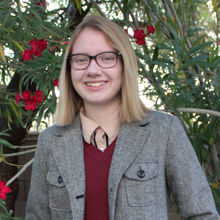
Michigan Technological University
Bio: I am an environmental engineering major in Houghton, Michigan, but I originally come from Las Vegas. In Houghton I participate in all things winter because this year alone we’ve had 261 inches of snow (I have forgotten what the sun looks like). As a member of Engineers Without Borders, my team is working on a water distribution system for a town in Panama. In my research I’m interested in climate change mitigation strategies and their application to the most victimized and underdeveloped areas.
SFI MENTOR: Elizabeth Hobson and Scott Page (secondary, provisional)
ABSTRACT:
Diversity bonuses occur when a group with diverse cognitive skills works together
inclusively on complex nonroutine tasks (Page, 2). The ideal cognitive repertoire and type of
inclusion differ depending on the task that needs to be completed. The goal of this project is to
understand to what extent diversity bonuses occur in philanthropic engineering, specifically
looking at projects done by Engineers Without Borders (EWB). Furthermore, the project will
examine variances in cognitive repertoires and types of inclusion present in EWB projects. By
examining the structure and composition of student chapters and comparing them with the
successes and failings of their perspective projects, insights into the ideal configuration can be
deduced.
Megan Bromley
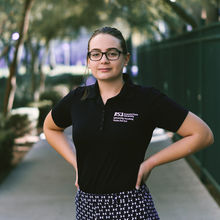
Arizona State University
Bio: Megan Bromley is an incoming senior at Arizona State University, where she studies Astrobiology and Creative Writing. She is also active in the Sun Devil Marching Band as a piccolo player and is a poetry editor for Superstition Review-- a semiannual online literary magazine that attracts authors from around the world.
Naika Dorilas
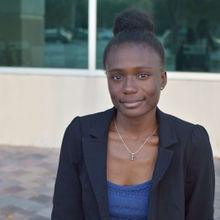
Florida Atlantic University
Bio: Hello, my name is Naika Dorilas. I am going into my senior year at Florida Atlantic University, and I am a mathematics major with a minor in computer science. I am very excited to learn and grow as a researcher in the SFI community because this is the field I want to dedicate my career to. Outside of academics, I volunteer at a horse ranch and with special needs children.
SFI MENTOR: : Jacopo Grilli (primary) and Andy Rominger(secondary)
ABSTRACT:
Provisional Title: Understanding Stability of Ecosystems In Higher Dimensions and Various Cases of Interaction Through a Random Matrix Theory Approach
For a lower dimension interaction matrix determined by specific species interactions, we aim to study the dynamics of the system at equilibrium by calculating and analyzing the eigenvalues of the interaction matrix A. This is done as a precursor to our study of random matrices. Random Matrices are used to model many interactions in nature between a number of species, S, in high dimensions (i.e. for sufficiently large S), and from it came many universal results for specific matrix configurations. We aim to explore the most important results from ecologists such as Robert May concerning matrix properties for specific configurations, and some configurations of A without well-established results. More specifically, we are interested in the distribution of eigenvalues of A and in turn, the interaction conditions necessary for coexistence.
Nicolas Gort Freitas
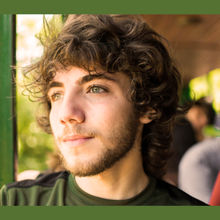
Minerva Schools at KGI
'Bio: Nico is a rising senior at Minerva Schools. He studies natural and computational sciences, concentrating in biology and statistics respectively. Nico’s interests range from systems and synthetic biology to linguistics and information theory. He is passionate about discovering new ways to model interactions in biological systems and their evolution. In his free time Nico enjoys hiking and dancing tango, and is keen on learning languages and playing folk versions of rock songs.
'url: www.ngort.com
Seung Yeon Han
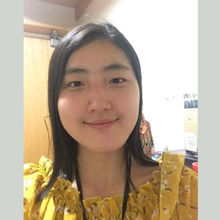
St. John's College
Bio: Hello, I'm Seung Yeon Han from St. John's College. You can call me Yona. I'm studying Liberal Arts in the college. Looking forward to meeting y'all! :)
SFI MENTOR: Mike Price (co-mentor), Andy Rominger (co-mentor)
ABSTRACT:
Provisional Title: Inequality level optimized for sustainable economic growth
Economic inequality has worried lots of people over the decades, but it is impossible to make it disappear completely. Then we should ask what is the optimized level of the inequality? But optimized for what? One of the side effects of economic inequality is that it can drive the life of the poor to below the adequate living of standard. Under the sustainable growth of the economy, the side effects of the inequality can be alleviated. Widening the access of the poor into the economic activities in the market is an effective way to ensure the sustainable economic growth. Therefore, one way to find the optimized level of the inequality can be the research on the inequality level for the highest employment rate.
Edward Huang
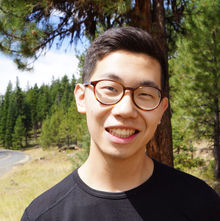
University of California, Berkeley
Bio:Edward is a third-year applied mathematics student at UC Berkeley with a concentration in computer science. Previously, he worked on undergraduate research in evolutionary ecology and radiobiology. His current research interests include neural networks, signal processing, and modeling complex systems. Apart from his studies, Edward serves as an ambassador for the outdoor brand Klattermusen and leads instructional rock climbing and mountaineering trips with other students.
URL: www.github.com/eghuang
SFI MENTOR: David Wolpert
ABSTRACT:
There has been much interest surrounding what properties about the universe can be derived by applying a mathematical formalization of information. Previously, Wolpert has demonstrated bounds on knowledge in any physical universe that allows agents to hold information concerning that universe by using the concept of "inference devices" (IDs). We seek to prove stronger statements about knowledge in a physical universe by considering inference devices that cannot make perfect predictions in Wolpert’s framework.
Alyssa Johnson

New Mexico Highlands University
Bio: I'm originally from Santa Fe, NM, and now study Mathematics and Sociology at NMHU in Las Vegas, NM. In particular, I'm interested in the sociology of our built environment, and issues such as climate change resilience, environmental justice, and housing policy. I've also done non-profit work in sustainability and climate change education. Currently, I'm living in and restoring a historic home, I sing in NMHU's Madrigal Choir, and I enjoy reading works of fiction and of creative nonfiction.
SFI MENTOR: Chris Kempes (primary), Geoffrey West (secondary), Mike Price (secondary, provisional)
ABSTRACT:
Provisional Title: Scaling in Housing Availability and Affordability
When discussing housing affordability and access, we often refer to a community’s average income or median home price, without taking into account the actual distribution, complete with skew and outliers, of these measures. This project aims to create a new measure of availability of affordable housing by quantitatively comparing the shapes of the frequency distributions of income and housing cost. I will then explore whether this measure of availability exhibits a scaling relationship with respect to city size, the way that so many other urban attributes do, and attempt to create a model that explains whatever scaling behavior may be observed.
Terran Mott
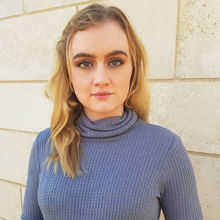
Grinnell College
Bio: My name is Terran Mott, I am mathematics and economics major at Grinnell College from Golden, Colorado. I'm interested in behavioral economics and human social systems. In my free time, I run cross country for Grinnell and enjoy spending time in the mountains.
SFI MENTOR: Chris Kempes (primary), Michael Lachmann (secondary)
ASPIRATIONAL ABSTRACT:
Provisional Title: What’s Up with Explicit Evolution of Scaling in Organic Architecture
My project will be an analytical abstraction of the concept that biological organisms at all scales rely on network structures to grow and thrive. Specifically, I will investigate the effect of selective pressure on the nature of these networks over many generations. I plan to simulate network growth at different scales by creating ‘nucleator populations’ of increasing area from which fractal structures can grow. Then, I will define a selective force that leads to sufficiently intriguing structure. This selection may incorporate fractal dimension, terminal points, or notions about the ability of each network to uptake resources from the environment.
I will then iterate an evolutionary process—via information inheritance and random mutation of the fractal structures—that will isolate ‘fit’ characteristics over many generations. Once each discrete scale of nucleator has undergone the evolutionary process, I will analyze the results with an eye for linear scaling relationships. I will also consider whether the same selection process produces different structural ‘solutions’ at different scales.
Mike Neuder
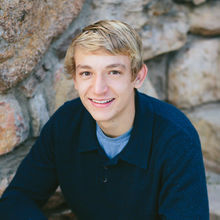
University of Colorado Boulder
Bio: I am a Computer Science and Math major from University of Colorado at Boulder. I spend most of my time working, climbing, playing chess and reading.
Personal url: https://github.com/michaelneuder
SFI MENTOR: Joshua Garland (primary), Andrew Berdahl (secondary)
ABSTRACT:
Provisional Title: Animal Tracking and Collective Behavior on UAV Video Data
Collective animal behavior is one of the canonical examples of Complex Systems, and with the immense development of machine learning, computer vision, and big data, we now have a new way to explore this phenomenon.
This project has two sequential parts. First, using video footage taken from drones flying above herds of caribou in the Yamal Peninsula in Russia, we seek to extract the trajectory data of each animal in the herd (which in itself is quite a difficult task). Once we have the trajectory data, there are several questions we seek to answer about the behavior of the group. The most fundamental aspect is the local interaction rules of the individuals in the group (e.g. individuals tend to repel each other at a close distance while attracting each other at a long distance to keep the herd together ). The followup and long-term goal of this project is to learn how animal herds behave in a resource gradient. We have the technology and capability to get extremely accurate data about the plant life of the land, which would allow us to create a resource map detailing where the plant life is concentrated. Overlaying the herd trajectory on this resource map would allow us to see the collection of animals interact with the gradient of the map and give us great insight into the capabilities of herds.
Oluwasunmisola Ojewumi
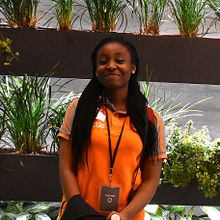
Minerva Schools at KGI
Bio: Hi! I'm Oluwasunmisola, and I'm from Nigeria. I am a Freshman at Minerva Schools at KGI, and I intend to do a double major in Natural Sciences and Social Sciences. I also enjoy writing, reading novels and craft making.
SFI MENTOR: Mirta Galesic (primary) and Mike Price (provisional)
ABSTRACT:
Provisional Title: Effect of Susceptibility Distribution on the speed of disease spread
A number of diseases still don’t have vaccinations available for them so health officials ask
people to engage in practices to reduce the spread of the disease such as washing of hands
and keeping their environment clean. However, people adhere to rules such as these differently
because of personal beliefs, stigma, norms etc. Therefore, people within the society would have
different susceptibilities to the disease (heterogenous susceptibility). This paper aims to find out
how the distribution of the susceptibilities in the community affects how fast the disease
spreads.
Alexander Ortiz
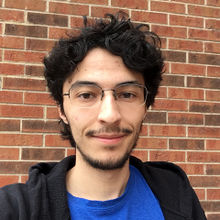
Northwestern University
Bio: I'm a third-year mathematics major at Northwestern interested in applications of math to problems in complexity science.
SFI MENTOR: Cris Moore
ASPIRATIONAL ABSTRACT:
Provisional Title: Algebraic Combinatorics Meets Markov Chains
A Hopf algebra is an algebraic structure that carries the data of an associative algebra with a unit, but also the data of a “coalgebra” and a “counit” satisfying certain axioms. One way to motivate Hopf algebras is the desire for a group object in monoidal categories that are not Cartesian. The data of a Markov chain, on the other hand, is essentially the data of a certain matrix known as the “transition matrix” which represents probabilities that a process transitions from one state to another. In her PhD thesis, Chung Yin Amy Pang described how to combine these data to essentially “break” and “recombine” combinatorial objects. This summer, I will be looking at Pang’s thesis as well as drawing from other resources to learn about some of the applications of these ideas as well as ideas from representation theory to understand random walks, card shuffling, and other combinatorial and topological objects.
Jaeweon Shin

Rice University
Bio: I'm a sophomore majoring in math at Rice University. I'm interested in understanding our society through quantitative methods. Look forward to meeting yall!
Sahana Subramanyam
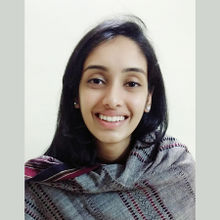
Azim Premji University
Bio: Sahana is majoring in Economics at Azim Premji University, India. She is currently researching how regressive social structures like caste emerge from certain micro-behaviours. Apart from her research, she enjoys illustrating.
SFI MENTOR: Mike Price (primary) and Paul Hooper (secondary)
ABSTRACT:
The model proposed consists of three network layers: the geographic, economic and social. The geographic layer consists of rural and urban clusters with edges representing inhabitation in these areas. In the economic layer, class relations are represented as nodes (the bourgeoisie and the proletariat) linked to each other through employment. The final layer is that of a social network. The project aims to understand rural-urban migration patterns of agents motivated by economic compulsions (modeled as wage differentials) and constrained by information of wages received through their social network. A potential emergent phenomenon that could be observed is that of ghettoization in terms of class or endogenous social group signals.
Keming Zhang
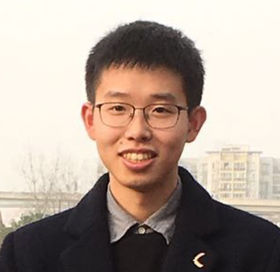
St. John's College
Bio: I am a junior at St. John’s College and study in the Great Books Program. I am interested in the application of mathematical and physical methods to social sciences. I am also quite interested in education and enjoy volunteering as a tutor.
REU Alumni Fellows
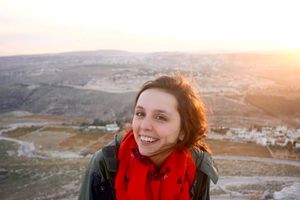
Cate Heine - Centre College to MIT
Bio: My name is Cate and I'm finishing up as a math major at Centre College in Danville, Kentucky. I like apples, mountains, crossword puzzles, and hanging out with my dog. I'm excited to begin pursuing a PhD at MIT in the fall in Social & Engineering Systems, using quantitative methods to analyze social systems. I'm especially fascinated by cities--the way that they change, grow, and affect peoples' lives.
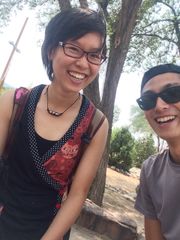
Xiaofan Liang (left in photo) - Minerva Schools at KGI
Bio: I am a junior at Minerva Schools at KGI with a background in both Computer Science and Sociology. I am passionate about computational social science and the social impacts of technologies on minorities. I work on the topic of Institutional Complexity and Efficiency - How Universities Scale with Chris and Marion as my mentors and Ryan as my project partner for almost a year now, starting from my REU experience last summer. Despite the love and hate, sweat and tears that involved, I find researching analogous patterns across social, biological and physical system fascinating and my next target are to model immigration flow patterns and see how its dynamics is different from data or other types of agents. Besides academics, I love playing basketball and currently work on a coding education software for a Hong Kong NGO serving migrant youth, and design unplug card games to teach people basic coding concepts.
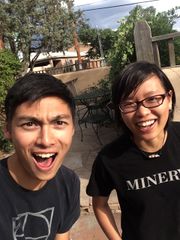
Ryan Taylor (left in photo) - Arizona State University
Bio: My name is Ryan Taylor. I entered the sustainability major at Arizona State University to study important global problems, which led me to complexity science and its overlapping set of universal ones. I sense that complex systems approaches will make much-needed theoretical contributions to politics and economics, not just in academia but in practice. Populism here and abroad makes me believe that big changes are possible by 2025, let alone 2050. So while all this is happening, I'm trying to ask helpful questions and avoid taking myself too seriously. I'm going into my senior year. I was an REU last summer! They're letting me come back to work with Xiaofan Liang and our awesome team of mentors on a project about university scaling. I grew up in New Mexico and love it here. Looking forward to meeting everybody.
